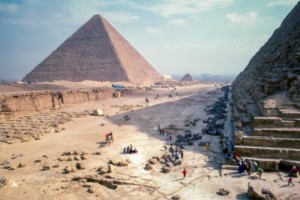Elevating Creation
(Taken from excerpts of a 1990 address by the Lubavitcher Rebbe, Rabbi Menachem M. Schneerson, on Shabbos Parshas Vayishlach, 14th Day of Kislev, 5751. Published by Sichos in English.)
The Torah portion Gen. 32:4 – 36:43 begins by relating how Ya’akov (Jacob) completed his service in Haran, establishing his family, and then sent messengers to Esav (Esau), his brother, in the land of Seir. This act is slightly problematic: Ya’akov was commanded by G-d to return to the land of Israel, and G-d promised him, “I will be with you.” So it does not seem appropriate for him to tarry and send messengers. On the contrary, seemingly, he should have proceeded directly to the land of Israel without any hesitation. This difficulty leads us to the conclusion that, as will be explained, in order for Ya’akov to return to the land of Israel in a full and complete manner, he had to send messengers to Esav.
There is another somewhat problematic point concerning Esav in this Torah portion. After the portion relates the events which transpired until Ya’akov returned to the home of Yitzchok (Isaac), his father, it chronicles Esav’s family and the nation Edom, which is descended from him. Thus the Torah interrupts the narrative of Ya’akov’s return to the land of Israel and the events which transpired afterwards with what appears to be a totally tangential matter, the chronicles of Esav. What is the reason for this?
The very fact that the Torah does relate the chronicles of Esav implies that they possess importance and are necessary to appreciate, by way of contrast, the chronicles of Ya’akov. Furthermore, their having been recorded in the Torah conveys upon them an eternal importance and implies that they convey a separate lesson, and are not mentioned merely to serve as a contrast to the chronicles of Ya’akov.
There is another problematic aspect to the chronicles of Esav mentioned in this Torah reading. At the conclusion of the Torah portion, Rashi interprets [Esav's descendant] the “lord of Magdiel” as referring to Rome. We must understand: a) On what does Rashi base this interpretation? b) What is his intent in conveying this information to us?
The encounter between Ya’akov and Esav should not be perceived as merely an isolated event. Rather, it reflects a pattern of service for Ya’akov that is relevant in subsequent generations until the final future Redemption. Ya’akov and Esav represent the Kingdom of Israel and the Kingdom of Esav (the symbol of all Gentile nations). In a larger sense this refers to [the Jewish people's] service in refining the world at large, elevating the Divine sparks that have become enclothed in the material substance of the world. According to Kabbalah, these Divine sparks fell from the [spiritual] realm of Tohu [described in Genesis 1:2]. Thus, they contain particularly high spiritual potentials, and their elevation can be compared to the repayment of a debt. To accomplish this purpose, Ya’akov sent emissaries to Esav his brother in Edom. [In Kabbalistic terms, after Ya’akov had completed establishing his own household in Haran, he had completed his refinements of the [orderly] spiritual realm of Tikkun (the realm which is intrinsically related to him, that is lower thanTohu). He realized that to complete his purpose within the world, he had to begin the refinement of Tohu, Esav’s realm, where Divine energies that transcend the level of Tikkun are revealed. To facilitate this objective, he sent messengers [actual angels from the realm of Tikkun] to notify Esav that this process was about to begin.
The messengers informed him, however, that Esav was not ready. On the contrary, he was marching against Ya’akov with 400 men of war! When Ya’akov realized this, he saw that his objective could not be accomplished immediately. Therefore, he decided [Genesis 33:14], “… I will proceed slowly, at the pace of the work that is before me… until I come to my lord [Esav] in Seir.” When will he come? Rashi explains, after the coming of Moshiach, when “saviors will ascend Mount Zion to judge the Mount of Esav and the sovereignty will be the L-rd’s” [Obadiah 1:21]. Then, G-d’s sovereignty will be revealed over all the inhabitants of the earth for eternity [Zephaniah 3:9].
Based on the above, we can understand why Rashi interprets Magdiel as referring to Rome. A question arises: what connection does the present exile [of the Jews] have with Esav? Rashi clarifies by explaining that one of Esav’s lords, Magdiel, is identified with Rome, [1] the power that destroyed the Second Temple and under whose authority the Jews will remain until Moshiach comes. [2]
[When the spiritual value of the nations of the world is analyzed, it is clear that] “quality” (or “inner content”) and “quantity” are interrelated. Particularly, when we are speaking about beings created by G-d from absolute nothingness, their very existence – and surely their quantity – is directly related with their quality, the Divine life-force which brings them into being. [3] Thus, the fact that the quantity of the Gentile nations is more than that of the Jews forces us to say that they also possess an advantage over the Jews.
The advantage possessed by the Gentiles parallels the advantage possessed by teshuvah [repentance, i.e. restoring one's connection to G-d] after sinning, over the essential service of teshuvah, which is teshuvah that is not to compensate for sin, but rather — as implied by the simple meaning of the term — the reconnection of the soul to its Divine source. To explain: most people’s conception of teshuvah is to repent for sin. Although this is a mistaken perspective — and, indeed, the essence of teshuvah is for the soul to reconnect and cling to its G-dly source — the fact that this perspective exists [4] indicates that even in truth, from a certain standpoint, teshuvah for sins does possess a superior dimension.
The advantage of that form of teshuvah is that it has an effect on — and transforms into holiness — a lower level of existence, a form of conduct which is against G-d’s will. The highest sparks of G-dliness are enclothed in this form of conduct [5] and through teshuvah, they are elevated to their source. Nevertheless, in an ultimate sense, there is an advantage to teshuvah which has no connection to sin, for through this form of teshuvah, we connect our souls to their source, the essence of G-d. [6] Indeed, it is this essential connection which generates the potential for repentance for sin and endows the teshuvah connected with repentance to lead to the reestablishment of the ultimate essential bond with G-d.
A similar concept applies in regard to the contrast between the Jews and the Gentiles mentioned above. The Gentiles possess an advantage in the realm of quality as well. For the refinement of the Gentiles elevates a higher level of Divine sparks, the sparks which fell from the [spiritual] world of Tohu. This makes possible the [fulfillment of the desire of] the A-lmighty to compel all the inhabitants of the world to accept [the Seven] Commandments which were commanded to Noah’s descendants.
These concepts can be related to the Torah’s mention of Esav and his descendants. This serves not only as a mere preparation for the description of the chronicles of Ya’akov and his descendants. Rather, it emphasizes that there is an advantage to the service of the Gentile and that this advantage can be achieved through the service of the Jews [by their teaching the Torah's Seven Noahide Commandments to the nations of the world]. Indeed, the most complete level of a Jew’s service must include these activities as well. This prepares the world for the revelation of G-d’s sovereignty and the advent of the era when “I will make the peoples pure of speech, that they will all call on the Name of G-d and serve Him with a single purpose.” [Zephaniah 3:9]
Based on the above, we can appreciate the sequence of the phases in Ya’acov’s service [as related in the Torah]. [First] Ya’akov established his own household and acquired his personal property, i.e., he [spiritually] elevated his portion in the world at large. This concludes with his arrival at Machanayim ["Camps"; Genesis 32:3], a name which he gave in recognition of the two camps of angels, the angels of the land of Israel and angles of the Diaspora, which he saw there. As explained, [7] these camps of angels refer to service in the realm of holiness and service in the realm of permitted things, respectively.
This, however, is insufficient. The complete fulfillment of Ya’akov’s potential also involves his refinement of the aspects of existence which are not permitted [to the Jews, but are permitted to the Gentiles]. For that reason, Ya’akov sent messengers to Esav. This service came as a result of his previous activity, i.e., Ya’akov’s efforts to establish his home and refine his surrounding environment. After completing the refinement to the extent of his capacity, Ya’akov was able “to dwell in the land where his father lived,” [Genesis 37:1] to the extent that he “desired to live in prosperity.” Surely, this does not refer to material prosperity alone, but rather, spiritual prosperity which reflects, in microcosm, the [future spiritual] prosperity of the age of the Redemption.
Since, however, Ya’akov had not completed the refinement (i.e., as of yet, he had not come to “my lord [Esav] in Seir”), he was not able to appreciate the full dimension of [spiritual] prosperity in this world. To enable him to do so, he became beset with the difficulties resulting from the sale of Yosef [Joseph], which ultimately led him to descend to Egypt. Ya’akov’s continued progress in those years and the refinement of [ancient] Egypt — which is connected with the transformation of the lowest aspects of existence — which he accomplished allowed him to enjoy true [spiritual] prosperity there.
The refinement which Ya’akov did not complete was left for his descendants. [This] service in the present [will] prepare the world for the revelation of G-d’s sovereignty. [Through] our service in the present generation, spreading the wellsprings of Chassidic teachings outward, [we have reached the phase of Iram]. [2] Esav’s power will be used to collect the treasures of the world and present them [to Moshiach].
All that is necessary is, to quote the Rambam [in Mishneh Torah, Laws of Repentance], to perform one good deed, and thus, “tilt the balance of the entire world to good and bring deliverance and salvation.” This is particularly true in light of the statement of the Previous Rebbe [Rabbi Joseph Issac Schneersohn(1880-1950)] — which was made years ago — that all that is necessary is to polish the buttons and to “stand ready and prepared” to greet Moshiach.
This should arouse great happiness and inspiration to increase study of Torah and, in particular, the inner dimensions of Torah as revealed in the Chabad Chassidic teachings. In this form, it can be studied together with the [previously] revealed aspects of Torah law, and they can be appreciated as two dimensions of “the perfect Torah.”
This study should lead to deed, an increase in the performance of the commandments with care and beauty, and an increase in one’s efforts to motivate others to similar activities, spreading Yiddishkeit and Chassidic teachings throughout the world. The above is particularly relevant in the month of Kislev [which concludes with Hanukkah], which shares a special connection with the revelation of the inner dimensions of Torah. This is evident, since it includes the Festivals of redemption: the 10th and the 19th of Kislev [when the Mittler Rebbe (Rabbi Dovber, 1778-1827) and his father the Alter Rebbe [R. Schneur Zalman of Liadi (1745-1812)], respectively, were redeemed from imprisonment in Russia on false charges], and the 9th of Kislev (the Mittler Rebbe’s birthday and day of passing).
May these activities lead to the coming of Moshiach … and the revelation — in a full and complete manner — of G-d’s sovereignty throughout the world.
FOOTNOTES
[1]. The connection between Rome and Magdiel can be explained as follows. The word Rome in Hebrew means “majesty.” Similarly, Magdiel can be interpreted to mean, “Who has been made great by G-d.” I.e., Rome is a power whom G-d granted greatness to.
[2]. In particular, Magdiel is not the final “lord” of Esav mentioned in the Torah, Iram is. Iram can be interpreted as referring to a second stage in the rule of Rome. First, Rome will become “greater.” Then, the Roman authority will be used for a second purpose, “to collect (which relates to the root of the name Iram) treasuries for Moshiach.”
[3] This is particularly true according to the explanation by the Baal Shem Tov that creation is an ongoing process and at every moment, all entities are being brought into existence anew.
[4]. The fact that a supposition to this effect exists within Torah indicates that this perspective has eternal significance, every concept mentioned by the Torah, in the Oral as well as the Written Law – even a supposition which is later refuted – is eternal.
[5]. This parallels the fall and the elevation of the Divine sparks of Tohu mentioned previously. In contrast, teshuvah which is not connected with [repentance for] sin relates to the realm of Tikkun which is, as above, on a revealed level, below the realm of Tohu.
[6]. G-d’s Essence being a level which transcends both Tohu and Tikkun.
[7]. To state the above in Midrashic terminology: it is related that Ya’akov sent the angels he saw in Machanayim [where he camped] as emissaries to Esav. Furthermore, when describing this vision of the angels, the Torah uses the term vayifgu. Pegi’a, the root of that word, connotes “prayer,” i.e., the angels prayed that Ya’akov would use them for this purpose.
[8]. Ultimately, in fact, the Russian government assisted in the Alter Rebbe’s redemption. This transformation relates to our Sages’ interpretation of the verse, “He redeemed my soul in peace because the many were with me” [Psalms 45:19]. Our Sages explain, “Even the soldiers of Avshalom [Absolom] prayed for David’s success.”
Presented by AskNoah.org and NoahideAcademy.org with permission of Sichos In English.




